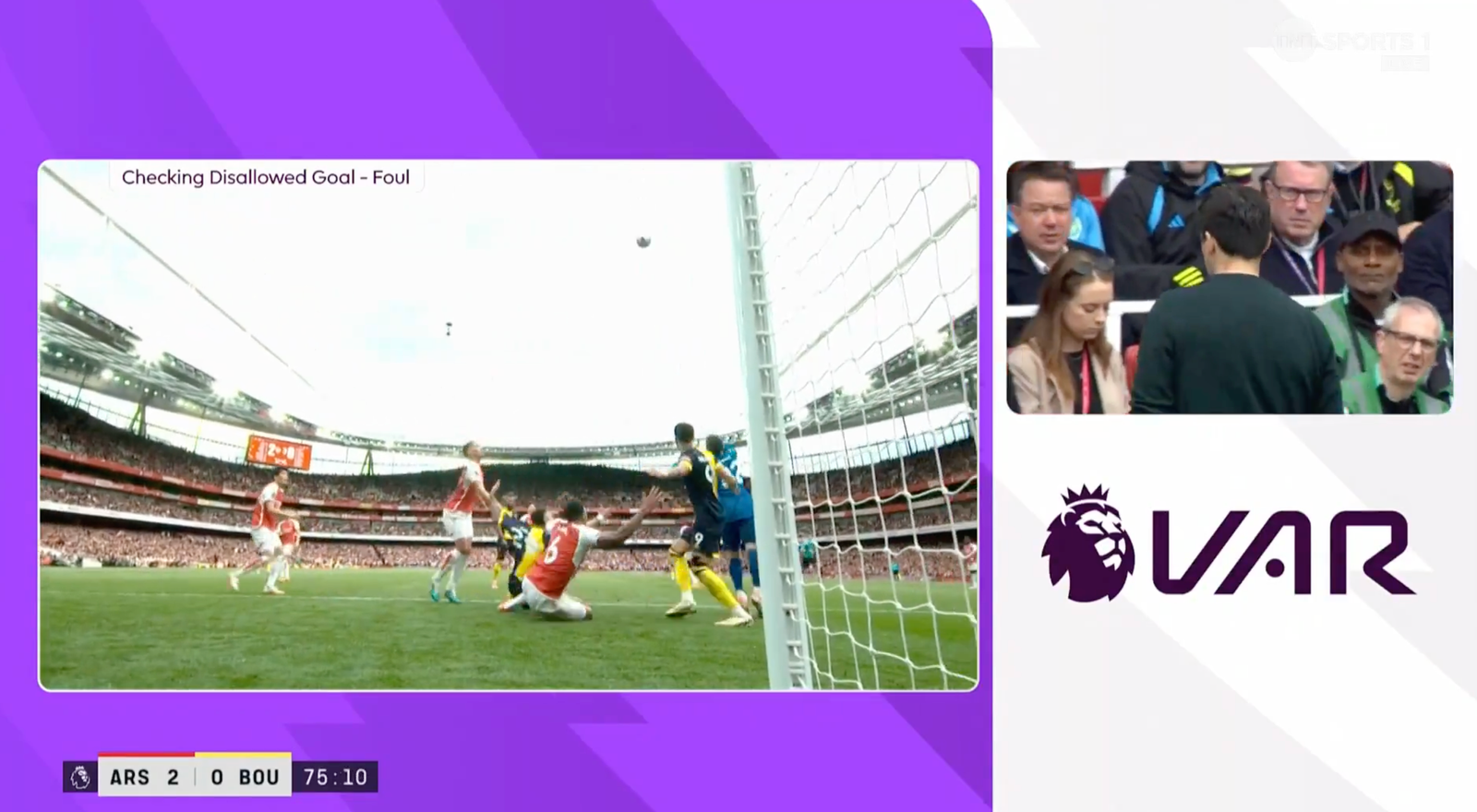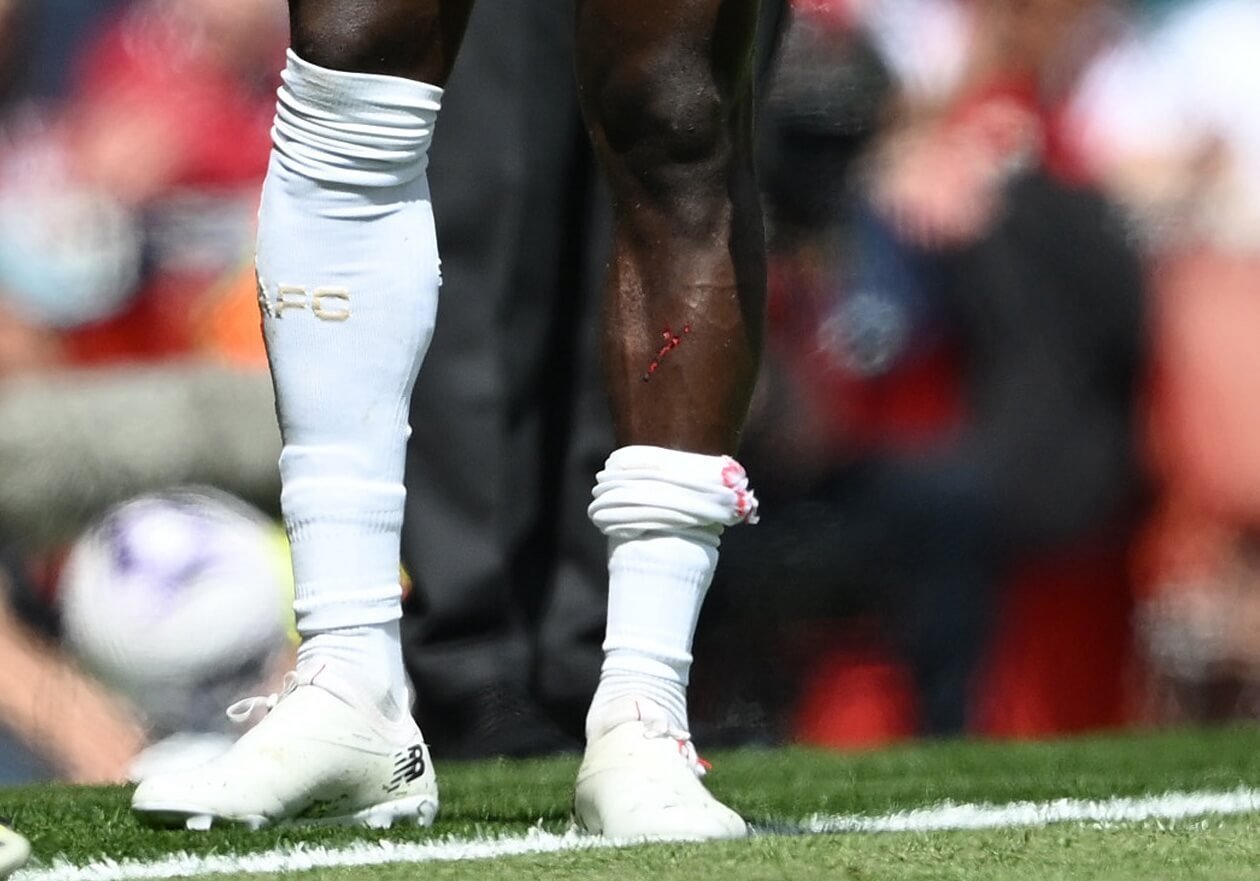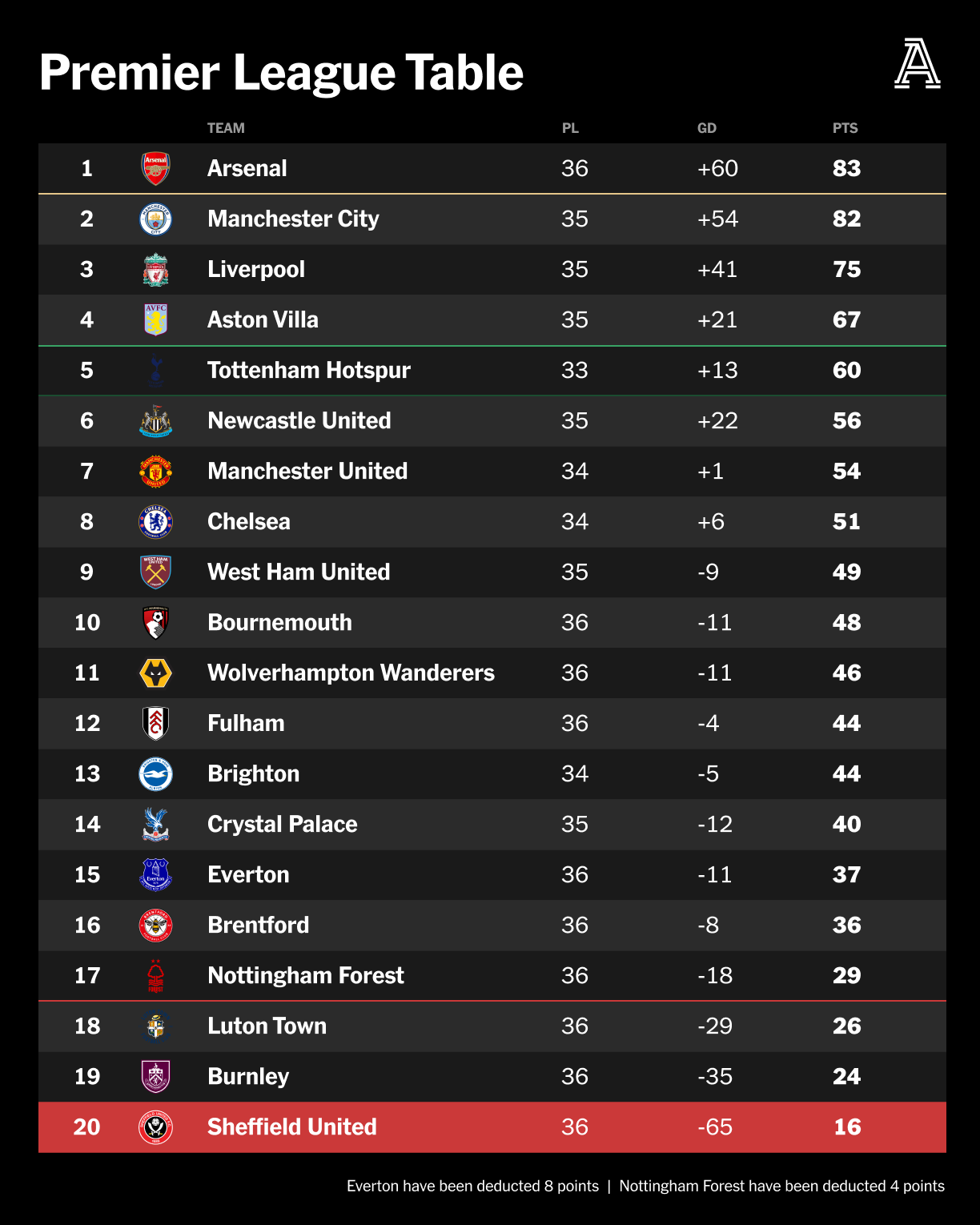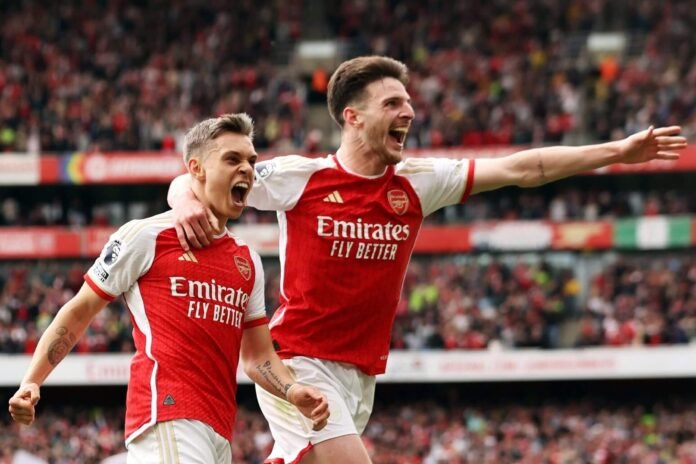Arsenal moved four points clear at the top of the Premier League with only two of their own games to play by beating Bournemouth at the Emirates, though second-placed Manchester City hit back to beat Wolves and move back within a point with game in hand.
Bukayo Saka was angered when a high challenge from Ryan Christie left him with a cut on his left leg, with VAR deeming it not worthy of a red card, but the officials agreed that Arsenal should have a penalty just before half-time when goalkeeper Mark Travers caught Kai Havertz’s trailing leg.
Havertz’s trailing foot hits Travers’ calf – penalty Arsenal (Shaun Botterill/Getty Images)
Saka rolled in the spot kick but Bournemouth grew into the game during the second half and it was only once Leandro Trossard added a second in the 70th minute that Arsenal felt in control, albeit the visitors had an Antoine Semenyo goal disallowed soon after for a foul on goalkeeper David Raya by Dominic Solanke, below.

Arsenal defender Gabriel Magalhaes thought he had scored a stunning third but it was ruled out because Havertz was offside, before Declan Rice fired in a third that did count. The win extended Arsenal’s lead at the top of the table to four points with two matches (for them) to play, though City cut that back to one by thumping Wolves 5-1 later in the evening and they have an additional game in hand (away to Tottenham on May 14).
Here Jordan Campbell analyses the win.
How was Saka’s mentality key?
When Saka stepped up to take Arsenal’s penalty in the final minute of the first half, the memory of last season’s miss at West Ham felt prominent inside the Emirates Stadium.
The only mind it did not seem to pervade was Saka’s.
He simply walked up, waited on Travers to lean to his left and passed the ball in the opposite direction as if there was not an ounce of tension in his body.
It showed the mental strength the 22-year-old possesses.
He could have shirked penalty responsibilities after the abuse that followed his miss in the European Championship final shootout three years ago but he has a spot-kick record of 10 from 11 since.
He could easily have swerved the pressure this season after he skewed his penalty wide of the post last April against West Ham, which could have made it 3-1 but instead swung momentum the other way in a match Arsenal went on to draw 2-2. It was the start of their late-season collapse in the title race but there was no such Sliding Doors moment on Saturday.
Saka caused havoc down the right flank as he continually got in behind Dango Ouattara but he had to once again show his durability after Christie’s straight leg caught him halfway up the shin — the challenge was cleared by VAR on a silent check.

The foul on Saka that was not given, above, and the mark it left, below (Shaun Botterill/Getty Images)

In converting that penalty, which was won after Havertz rounded Travers and had his trailing leg tripped, Saka went to 20 goals for the season. He is the youngest Arsenal player to reach that milestone since Martin Hayes in 1986-87.
How many vital goals has Trossard scored?
Bournemouth could easily have been three or four goals down by the break, but head coach Andoni Iraola managed to flip the game as his side dominated the opening 25 minutes of the second half. With the score only 1-0, Arsenal could not arrest the momentum switch. But when one chance comes against the run of play, there is one man in this squad who can be trusted to convert and that is Trossard.
Rice did brilliantly to tee him up on the spin but Trossard curled the ball into the far corner so early Travers had no chance.
The Belgian has 16 goals in all competitions, which puts him second in the squad behind only Saka. Given he has started only 21 of their 50 games, he is scoring at a rate of one goal every 132 minutes. The January 2023 signing made a bigger impact from the bench in his first year at the club, but in the past few months he has asserted himself as a more consistent option than Gabriel Martinelli.
Trossard is a man for the big moments, and he proved it once again today.

His campaign started with an equaliser deep in second-half stoppage time against champions City in the Community Shield victory in August and has gone on to include September’s winner against Everton, a late leveller away to Chelsea the following month, and a goal to take Porto to extra time in a Champions League last-16 tie where Arsenal prevailed on penalties.
But he changes games with his goals, too: the one he scored to kill off a 3-1 February victory over Liverpool, the opener against Wolves last month and the first at home to Chelsea a few days later.
The chants of ‘Leo!’ as he came off in the 79th minute today showed how highly Arsenal fans value his decisiveness.
Did VAR get the big calls right?
VAR is not there to re-referee a game, so it is said. There is a high threshold of ‘clear and obvious’ before the VAR official will contemplate suggesting to the on-field referee that he may have got it wrong.
That is a sound principle, but in that case there should be little delay.
That was not the case with two of the three subjective calls at the Emirates, which led to significant stoppage time in the game and the players looking confused as to what referee David Coote was signalling while he waited.
Christie’s high challenge on Saka, which on a still image (see above) looked worse than it was in real time, was silently checked by VAR and the game moved on. But the foul on Havertz for the penalty should have been cleared within a few replays. Instead, there were several minutes in which Coote chatted in the penalty area rather than going over to the screen to back up his own decision.
He had made the right call initially as Havertz was clearly caught but the idea of a referee ‘selling’ their decision to the match-going fans has long been ditched.
It led to the same situation when Bournemouth had a second-half goal disallowed, which would have made it 2-1 and led to a jittery final 20 minutes. Solanke moved into Raya’s path as the ball spun in the air but the contact was minimal and the Arsenal goalkeeper’s punch was poor. The second rebound was turned home but Coote blew for a foul.
Iraola and his assistants laughed on the bench when they saw the replay as they waited for a decision to be communicated. There was a several-minute delay once more when it could have been cleared up if Coote had been asked to go across and back up his own decision.
In sticking with a rigid, arbitrary ‘bar’, it begs the question as to what the point of VAR is if the referee will always be backed on subjective calls?
What did Mikel Arteta say?
“The summer signings have raised the bar a lot. If we spend money we’d better do it wisely and in the most effective way. We’re really happy with the recruitment that we had. It had a big impact in the team. It has raised not only the level of the team but the level of the rest of the players, as well. You see today we had some big performances from a lot of individuals.”
What next for Arsenal?
Sunday, May 12: Manchester United (A), Premier League, 4.30pm BST, 11.30am ET
Historically, this Premier League fixture has usually seen two title favourites going head to head in a combustible clash. But these days, only the north Londoners are hoping to boost their championship challenge.
Arsenal have a poor record at Old Trafford in the Premier League, having only won in four visits since the competition’s inception in 1992-93 (31 matches). However, Arteta was the manager who ended their 14-year wait for a win at Old Trafford in November 2020. A second-half penalty from Pierre-Emerick Aubameyang was enough to see off Ole Gunnar Solskjaer’s United 1-0 that day.
What’s the title run-in?
Arsenal’s remaining fixtures: Sunday May 12, Manchester United (A); Sunday May 19, Everton (H).
City’s remaining fixtures: Saturday May 11, Fulham (H); Tuesday May 14, Spurs (A); Sunday May 19, West Ham (H).
Recommended reading
(Top photo: Ryan Pierse/Getty Images)
Read the full article here


